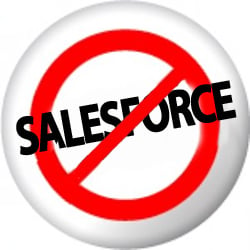Last year, Salesforce reported that they had 150,000 customers and over 3.75 million subscribers. They have many different products, including their Customer Relationship Management (CRM) software named the Sales Cloud. The Sales Cloud is a very useful technology for managing the business and sales process, but there are some other things to be aware of. I’m going to share three reasons why you shouldn’t use it for document storage, especially legal contracts.
1. Manual Contract Review
The Sales Cloud was built as a relational database, meaning that every unique object inside the Sales Cloud (Lead, Account, Opportunity, Task, etc) is stored in separate tables and then linked together. So why does this matter? You cannot easily get access to data that is interconnected, like document attachments. Let’s go through an example:
Say you’re a General Counsel who’s working at a technology company that is rapidly growing. Last year you implemented a process where you would summarize each custom contract that you executed into the contract object. So things like the renewal date, automatic renewal clause, payment terms would all go inside based on the executed agreement stored in the 'Account' page. Now lets say you need to review 10-15 specific contracts for an audit or internal review. Because the Sales Cloud CRM has limited text search and basic file-name level reporting, here’s what you would have to do:
- Manually click into each Account
- Sort through the list of documents to find the contract
- Download each document
- Read every document manually
- Make any updates in the account information
Its 100% manual because the Salesforce has so many limitations in this arena. You will have to do this one by one and that could turn this project into a week of work for a simple legal contracts review.
2. Poor Search and Reporting Capabilities
You might have read in a previous post about Why Salesforce Isn’t for Legal, where we talk about the limited search but it’s worth mentioning again and providing an example. Let’s imagine that you are a Corporate Counsel and your VP of Engineering just swung by your desk to tell you that there’s been a confirmed security breach of customer data. He’s unsure about the scope of the exposure, but he knows that it’s serious and customers must be notified.
You think, sure we can find this in the CRM. So you log into your Salesforce account and go to the search bar at the top and type in “security breach” and the search reads "0 results - try again".
You then go to the Reporting tab and search for a type of text based report to run. Then you realize there’s no text reporting its only reporting on the fields that are inside the CRM like the 'Accounts' or 'Opportunities'. You feel your confidence dropping, as you begin to understand that this answer isn’t as easy as you thought it was going to be.
It’s in that moment that you remember that some customers asked to be notified within 24 hours of a data breach in writing and you know that your company is exposed to legal risk if you don’t notify them. Your Sales Ops lead gives you a blank stare when you ask them to download all the files that are stored as attachments, because it’s not a trivial exercise. You’re on the clock now, but Salesforce wont be much help. This is the challenge of using a sales tool for legal work.
3. Versioning is Confusing
During a contract negotiation there’s usually multiple participants and also multiple copies of an agreement in process. There’s nowhere to upload multiple versions of a contract into the CRM. You’re stuck with upload each version of the document as an attachment.
At this point, hopefully you've instituted a naming convention and its getting followed. Now the 'Account' contains multiple version of the same contract, so when you start looking for the final version to review you may have some trial and error to find the right document.
These are just a couple ways that storing legal contracts in Salesforce CRM can be a challenge for finance and legal teams. Visit LinkSquares to learn more about our contract analytics and reporting tools that are built on top of salesforce to make this process easier.
Subscribe to the LinkSquares Blog
Stay up to date on best practices for GCs and legal teams, current events, legal tech, and more.


